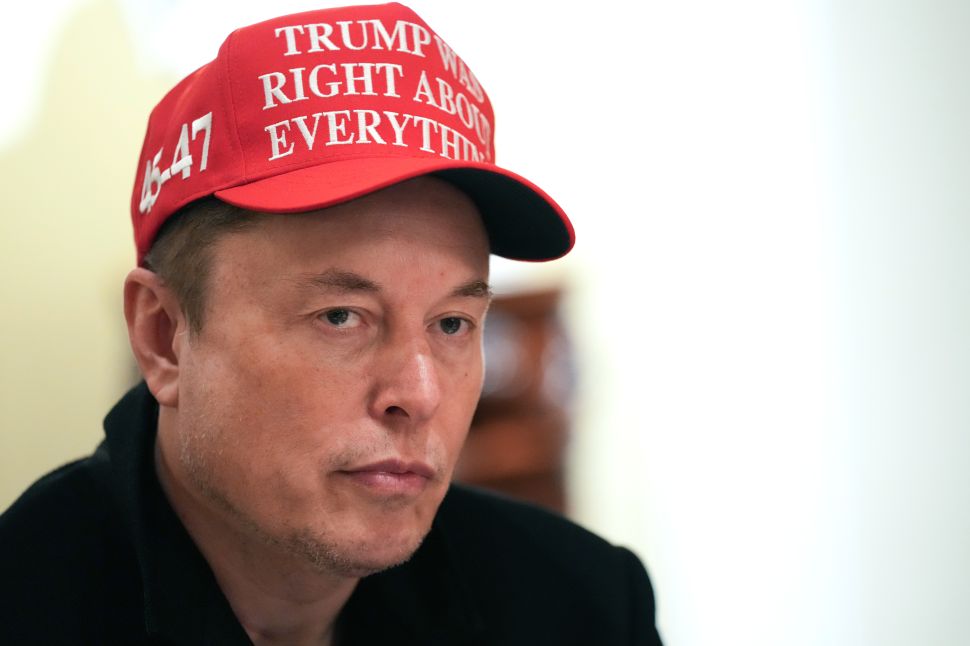Elon Musk) in red hat that reads ‘Trump was right about everything”” width=”970″ height=”647″ data-caption=’Elon Musk attends a cabinet meeting held by U.S. President Donald Trump at the White House on March 24, 2025. <span class=”lazyload media-credit”>Win McNamee/Getty Images</span>’>
It shouldn’t come as a surprise that Tesla (TSLA), helmed by the Trump administration’s “First Buddy” Elon Musk, has been largely spared by incoming tariffs on foreign-made automobiles. The electric carmaker’s localized manufacturing will be its saving grace amid incoming levies on imported cars. However, like the rest of the U.S. carmakers, Tesla could still face higher costs on auto parts imported from tariff-hit nations.
In what represents the latest salvo of a chaotic trade war, Trump this week imposed 25 percent tariffs on imported passenger vehicles, light trucks and key car components like engines, transmissions, and powertrain and electrical parts. Despite his close relationship with Musk, Trump said that the Tesla CEO didn’t advise him on the levies due to his business conflict.
The tariffs, which take effect on April 2, are expected to drastically shake up America’s car industry and hike up prices for some of the country’s largest brands. Both Toyota and General Motors (GM), for example, import roughly half of their cars into the U.S. Ford (F) manufactures around 80 percent of its cars in the U.S., while its electric Mustang Mach-E is assembled in Mexico.
Tesla, in contrast, manufactures all of its U.S. vehicles in California and Texas, making it largely immune to the new tariffs. As Daniel Roeska, a Bernstein analyst, put it: “Tesla wins, Detroit bleeds.” Some carmakers have already increased prices, with Ferrari, which produces its vehicles in Italy, announcing yesterday (March 27) that certain models will become 10 percent more expensive in light of the tariffs.
Musk maintains that Tesla won’t be completely unscathed. “The tariff impact on Tesla is still significant,” said the CEO in a post on X. While Tesla’s cars might be manufactured in the U.S., not all of its components are. Between 60 to 70 percent of Tesla car parts are made in America, while the rest primarily come from Mexico, according to the U.S. National Highway Traffic Safety Administration. The company additionally imports batteries from Chinese companies.
The concept of a car made entirely with U.S. parts “is a fictional tale,” said Wedbush Securities analyst Dan Ives in a note, adding that even automakers with localized manufacturing still rely on importing 40 to 50 percent of their car parts. “It would take four years to move 10 percent of the auto supply chain to the U.S. and cost hundreds of billions with much complexity and disruption,” said the analyst, who predicts the tariffs will raise U.S. car prices on average by $5,000 to $15,000.
Tesla’s reputation continues to take hits
While Tesla likely won’t have to increase prices as much as its peers, its reputation is still in danger due to Musk’s power in Washington. Musk’s role as head of the Department of Government Efficiency (DOGE) has caused some Tesla customers to back away from the company, with Tesla’s sales in the first three months of 2025 expected to fall by 14.5 percent compared to the previous quarter, according to a report from Cox Automotive. Meanwhile, listings of used Tesla cars were up 33 percent year-over-year between January and March, per Cox Automotive.
In recent months, Tesla has emerged as a prime outlet for Americans who are upset at the Musk’s growing political influence, as evidenced by a rise in protests against Tesla dealerships and vandalism against its vehicles that U.S. Attorney General Pam Bondi has described as “domestic terrorism.” Demonstrations are expected to ramp up tomorrow (March 29) as activists plan a “Tesla takedown movement” that will see rallies take place across hundreds of Tesla locations in the U.S. and worldwide.

